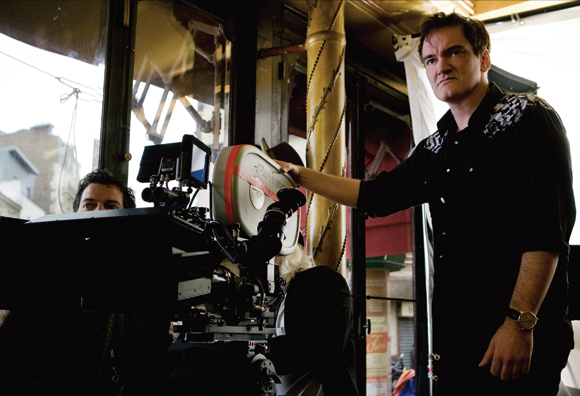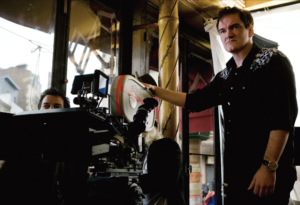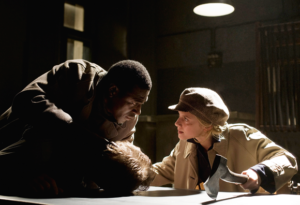Quentin Tarantino isn’t exactly a man of hidden depths. Not that he doesn’t have depths, rather that he’s not too fussed about hiding them. His oeuvre – for which a French word feels instantly inappropriate – is an openly masculine one that deftly blends bawdiness with violence in a dashing, dazzling, men’s thinking universe, enriched with cinematic references and genre gimmickry, populated with actors mostly cast not for themselves but for their own prior signature roles. So what? Quentin Tarantino makes guy movies, and great ones at that. Like his misfits on-screen, the man himself is a handful in interviews. Considerably built with a strong voice and slightly overgrown chin, he jabbers breathlessly through film links, personal recollections and scattershot opinions. When he speaks, he uses commas, not full stops – that highly energised enthusiasm that boils over irresistibly every time he opens his mouth, making any objections and qualifications look devastatingly obtuse. “This is gonna sound like a smartass answer, but I have to say, it‘s obvious, but it so needs to be said: I‘m a good writer”, he recently clarified his position when tackled by Sight & Sound about the poor critical reception of his last film Death Proof, his half of Grindhouse, the double feature and box-office flop that he directed with Robert Rodriguez. Tarantino, it seems, doesn’t need outside validation.
This morning however, the geek-genius of American cinema is looking a little twitchy. It’s the last Wednesday of Cannes 2009, and the hotter-than-hot premiere of the day is Tarantino’s long-gestating World War Two extravaganza Inglourious Basterds. Hastily sipping on a glass of champagne at the official press conference and appropriately well-dressed for the occasion (today in a shiny black suit jacket to further his top flight air), he is about to face the first squall of questions from the lucky chunk of the world’s critics who have just seen the very first (and most likely not final) version of the film at an absolutely packed to the rafters press screening, even before the cast and crew. As it happens, faq has that privilege too.
“Don’t get me wrong, I wasn’t being cavalier when I said at one point that I wouldn’t make it”, Tarantino says stern-faced, with an air of consequence. “This movie meant everything to me, but there was also something very liberating about knowing you wanted it exactly the way it had to be and you wouldn’t walk away from it rather than make a compromise – like this is either gonna be right on or it ain’t on at all.” He has a point: Barring the title in no significant way related to Enzo G. Castellari’s schlock 1978 Italian WWII venture, Inglourious Basterds sets up an arch, episodic larger-than-life fantasia around a band of Jewish-American soldiers, led by a bare-knuckle Brad Pitt as Lieutenant Aldo Raine, who are out on a scalp-hunting revenge quest against the Nazis in occupied France. While the ‘Basterds’ lay their scheme to take down the leaders of the Third Reich with indispensable support by German actress turned double agent Birgit von Hammersmark (Diane Kruger), the vengeful Jewish cinema owner Shosanna Dreyfus (Mélanie Laurent) is poised to exact her own vengeance after an unwanted acquaintance with Nazi war hero Frederick Zoller (Daniel Brühl), who calls himself „the German Sgt. York“ for his exploits at taking out dozens of Allied soldiers single-handedly, a feat celebrated in a new German movie, „Nation‘s Pride“ starring Zoller himself in the lead …you get the idea.
Even though Tarantino has good reason to be nervous, underpinning every single one of his answers is this unshakable belief in his own ability that allowed him to rock the festival for the first time 17 years ago with his stylish, strikingly individual directorial debut Reservoir Dogs. It also gave us the maximised ingenuity of Pulp Fiction, a bold, skilfully woven crime tale that overspills with snaggled plot lines, a gorgeous soundtrack and audaciously patterned edits, for which he deservedly received the Palme de’Or in 1994. Though is was after testing deeper waters with the superb Elmore Leonard adaptation Jackie Brown, that the 46-year old saw his fortunes oscillate. If the Kill Bill two-parter still powered up to a wildly exciting, stunning match of bloodlust and film-love, his aforementioned tongue-in-cheek tribute to stunt drivers, chicks and sleazy seventies slasher movies, Death Proof, was crushed by critics and fans alike. And if one aberration is allowed, there has been increasingly cutting gossip about his “bunch of guys on a mission movie“ like, forever. After all, Tarantino took over eight years to write the Basterds script but merely eight odd months to shoot it. “You’ve seen the script cover, right?” He shrugs, settling in his chair. He’s referring to the now-famous scrawled, misspelt title page, dated July 2nd 2008, that was circulated online within days after he completed the first draft. “That was the day I finished writing. That’s when I put down the pen. No joke.” He pauses for effect. “I finished the script and I just said, ‘What would make this thing perfect would be to finish it and take it to Cannes in May.’”
Truth is though, Inglourious Basterds is not perfect. Nonetheless it is thoroughly entertaining and has Tarantino’s finest fingerprints all over it. Arguably his most challenging film to date (his sixth film in 17 years), it’s fair to say that it shows a serious return to form that thrills from its engaging opening sequence in which a viciously evil Christoph Waltz steals the show as the SS genius Colonel Hans Landa on a hunt for hiding Jews in the French hillside to the history-bending final act that plays out in a Scorcesean flourish of violence. “It’s the power of cinema that is going to bring down the Third Reich,” he says, “and I get a big kick out of that.” Like Tarantino’s ambition, the list of filmic references is virtually limitless, conforming to his out-there standards and expanding between some cracking dialogue and Tarantino’s apt use of some fabulous Morricone music. Not only is Tarantino on fine storytelling form, the cast is right there with him, and the whole Death Proof debacle seems to have made him reconsider his roots. “To me, it’s a lot like Pulp Fiction,” he enthused to a reporter during shooting in Berlin, “and it’s a lot like True Romance and it’s a lot like Reservoir Dogs. We have a bar scene that’s like a reduced Reservoir Dogs, but with Nazis and spoken in German. It’s a 23-minute scene, and instead of the warehouse they’re in a little basement bar.” He catches his breath. “But then it also kind of reminds me of True Romance a lot, because there’s always a new character, who comes in and takes the movie – someone who just takes the movie and runs with it. There’s that aspect to it that I just feel when I watch a scene. Every 20 minutes it’s like, ‘What the fuck movie is this?’”
Though Tarantino‘s obsession with cinema is usually traced to his years spent working in the Video Archives store in Manhattan Beach, CA, his childhood was where he first lost himself in film. Born to 16-year-old Connie McHugh, and itinerant actor Tony Tarantino in Knoxville, Tennessee, he was brought up by his mother in suburban Los Angeles. They moved constantly, and Tarantino once described himself as ‚the dumb kid who couldn‘t keep up with the class‘. Often, he simply didn‘t attend school, hiding in the house until his mother, a nurse, left for work, then spending the day in front of the television or perusing his comic collection. “Before I worked at the Video Archives, I’d get the TV guide every week and read it cover to cover”, he says. “But then I had access to all these great films and terrific directors in the video store. I’d watch them every day. So I’d become a fan of Eric Rohmer. And just watch one movie after another and work through different directors’ careers.”
The spark that let to Inglourious Basterds is largely due to Sergio Leone. “I heard a long time ago that one of the films Leone was thinking about doing before he died was a movie about the Battle of Stalingrad. And then I thought ‘Wow, that would be really, really, wonderful’, and I remember thinking ‘Wouldn’t it be cool to do a WWII movie?’…do it like a spaghetti western kind of film but do it with WWII iconography, because the situation in Europe at that time really was like the closest thing the twentieth century has had to a spaghetti western landscape, where life is cheap and it’s easy to die…it’s a no-man‘s-land the way that those universes are, and I thought it would be really cool to forge these two separate styles together.”
Adding an interesting layer to Tarantino’s dynamite sense for visual and verbal quirks is that the characters in the film speak their own languages, resulting in a rich linguistic mix that is as dazzling as it is intriguing. “Everybody is playing double roles,” Tarantino smirks. “They’re passing, they are hiding, they have different agendas, and we don’t quite know what everybody’s story is. We might know what they say, but we don’t really know if they are telling the truth. I love that aspect, that everybody speaks their own proper languages. But not only that, the Germans are really played by Germans not Swedes, not Dutch, no, Germans.” As one might expect, however, Tarantino isn’t out there to teach a lesson on how to make a proper real-world war movie. Rather he has created another genre love letter that in its heart, paradoxically, seems to be more about pulp fiction than Pulp Fiction.
The instinctive certainty with which he chooses projects and the unpredictable writing process that goes with it, has led to long periods of dry spell for Tarantino fans on his way from one film to the next. But to create the films he thinks “would be fun to do” and turn them into something as raw and visceral as Reservoir Dogs, or as thrillingly outrageous as Kill Bill, he takes his time, time that he spends writing but also watching, acting in and producing other people‘s films, allowing the hype to grow. A departure from his usual pulp-fun path, Inglourious Basterds not only plays refreshing and intelligent games with genre, the film and its mixed reception in Cannes have brought Tarantino right back where he feels home the most: at the very centre of talk and controversy. And the skewed title, is seems, has done its bit to it too. So what’s that misspelling all about? “You know what, here is the thing”, he chortles, then suddenly turning oddly serious. “I’m never going to explain that. Because, you know, when you do an artistic flourish like that, to describe it, to explain it, it just takes the piss out of it and invalidates the whole stroke in the first place. Basquiat takes a letter ‘L’ from a hotel room door and sticks it at his painting. If he describes why he did it he might as well have not done it at all.”






